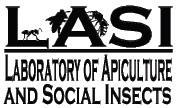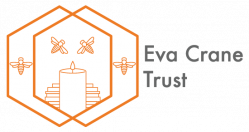LASI Bee Research and Outreach
LASI Bee Research and Outreach

Outreach Of Apllied Research Results To Help Honey Bees
We are very grateful to the trustees of the Eva Crane Trust for supporting the Laboratory of Apiculture and Social Insects (LASI) outreach activities.
Sharing our knowledge and findings with relevant audiences is vital to our mission to make a positive and practical difference to the health and well-being of honey bees in the UK and beyond.
We communicate our science in a variety of ways, including workshops in our dedicated bee lab, talks, presentations, leaflets and films.
Thanks to your support, this year we were able to hold a series of seven workshops on the following important topics:
- Determining the Most Attractive Plants for Bees and other Flower Visitors (2 workshops): How to help bees and other flower visiting insects by planting the right flowers.
- Breeding and Using Hygienic Bees (2 workshops): How to use hygienic bees to help control brood diseases.
- Integrated Varroa Management (3 workshops): A workshop to help beekeepers manage honey bee pests and diseases.
We have a LASI YouTube channel in order to make videos widely available to people all over the world. To support these workshops we have also produced two films. The first video illustrates ‘How To Determine Varroa Infestation Levels In Hives’ and the second ‘How to apply oxalic acid to honey bee colonies via sublimation’
These can both be viewed on: https://www.youtube.com/user/LASIbeeResearch
We have created two "How To" pamphlets on the topic of "How to Apply Oxalic Acid Via Sublimation to Control Varroa". Printed copies were given away at events such as the National Honey Show.
We also translated the pamphlets into three other languages: French, Dutch and Finnish. Next year we plan to make translations into additional languages and also to translate other pamphlets. Beekeeping is a worldwide activity and we are committed to making our findings available to as wide an audience as possible. Importantly, the information being provided in these pamphlets is relevant to beekeeping in all countries where they have varroa mites and European honey bees.
We also recognise that Dr. Eva Crane was herself committed to international communication, through the Multilingual Dictionary of Beekeeping Terms, for example. For further information on our pamphlets, please visit:
http://www.sussex.ac.uk/lasi/sussexplan/varroamites
Details of the workshops and full report can be downloaded here: Outreach Of Apllied Research Results To Help Honey Bees
Michael Edmonds
Development Manager
December 2016
